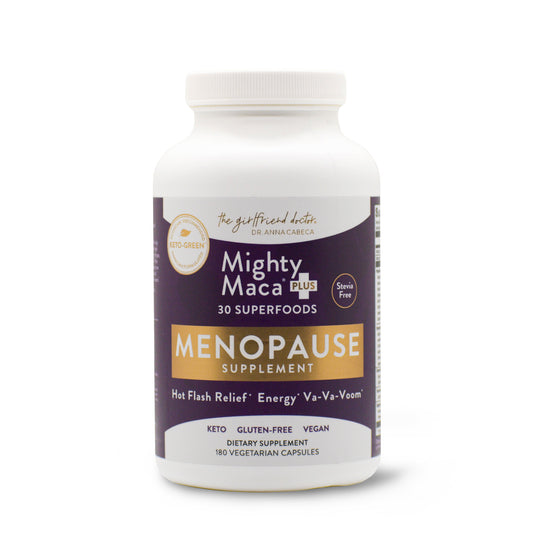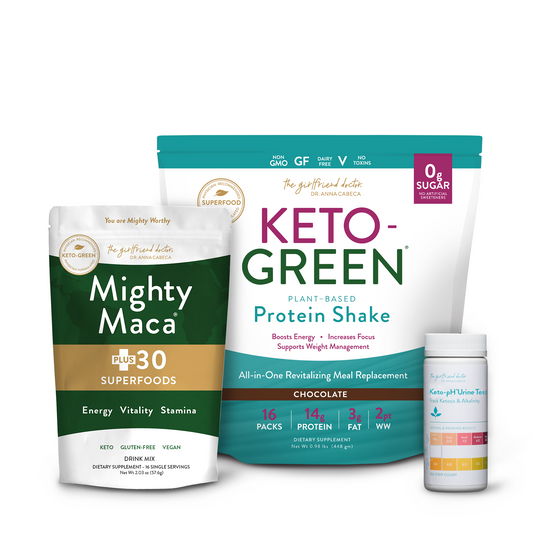If You Feel Like You’re on a Hormonal Rollercoaster But Your Doctor Says You’re “Not in Menopause Yet”… You’re Probably in Perimenopause.
Let’s get real, girlfriend.
Have you ever found yourself wide awake at 3 a.m., sweating through the sheets with your mind racing? Or maybe you’ve started snapping at your loved ones over the smallest things, or you feel like you’re living in a brain fog you just can’t shake? Maybe your periods, once so predictable, are now showing up whenever they feel like it—or sometimes not at all.
If you’ve been told “You’re not in menopause yet,” but you know something is changing, you’re NOT imagining things. Welcome to perimenopause—the hormonal transition that catches so many of us off guard.
I’m Dr. Anna Cabeca, your Girlfriend Doctor, and as someone who went through early menopause myself, I know firsthand how confusing (and sometimes lonely) this time can feel. I also know that with knowledge, compassion, and a few powerful tools, you can navigate perimenopause with so much more grace, confidence, and even joy.
Let’s break down exactly what perimenopause is, how to spot the signs, and most importantly—how to support yourself naturally so you can feel like YOU again.
In This Article, You’ll Learn:
- What perimenopause is and how long it lasts
The most common signs and symptoms (including some surprises!)
The four stages of perimenopause and what to expect at each
Natural remedies and daily rituals to balance your hormones
How to track your journey and get the support you deserve

Perimenopause is the hormonal transition leading up to menopause, when your ovaries gradually produce less estrogen, progesterone, and testosterone.
Key points:
Can start as early as your late 30s (and sometimes even sooner)
Lasts an average of 4–10 years , but can be shorter or longer
Ends when you’ve gone 12 months without a period (that’s menopause!)
This transition is sometimes called “puberty in reverse,” and honestly, it makes sense! Your hormones don’t just drop—they can swing wildly, up and down, month to month or even week to week. That’s why the symptoms can feel so unpredictable, and why some months feel “normal” and others feel completely upside down.
Why Does Perimenopause Happen?
Simply put, your ovaries are getting ready to retire. But before they hand over the baton, they make less of the hormones your body has relied on for decades. This drop and fluctuation in estrogen, progesterone, and testosterone causes the symptoms you’re feeling.
You might notice that some months your symptoms are mild and barely there, and other times it’s like you’ve got all the menopause symptoms at once. This is normal—if not always easy!
Signs and Symptoms of Perimenopause
Let’s talk specifics. Perimenopause doesn’t look the same for every woman, but there are some classic symptoms that almost everyone experiences at some point.
Common Signs of Perimenopause
🌀 Irregular periods (shorter, longer, heavier, skipped)
🔥 Hot flashes and night sweats
😭 Mood swings, anxiety, or tearfulness
😴 Sleep trouble or waking at 3 a.m.
🧠 Brain fog or forgetfulness
🪞 Weight gain (especially belly fat)
💧 Vaginal dryness or discomfort
😕 Lower libido or intimacy issues
💔 Heart palpitations or new sensitivities
🦴 Joint aches or muscle stiffness
😣 Increased PMS or “period surprises”
“I felt like a stranger in my own body. Once I understood it was perimenopause, everything clicked.” – Girlfriend Doctor Club member
Pro tip: These symptoms can pop up years before your last period. If you notice three or more, it’s time to start supporting your body for perimenopause.
The 4 Stages of Perimenopause
Understanding where you are on the journey can help you make sense of what you’re experiencing—and which remedies or lifestyle changes might help most.

Cycles are still regular (maybe a few days shorter or longer)
Subtle mood or energy changes begin
PMS can worsen, or you might feel more sensitive than usual

Periods become less predictable—sometimes heavier, sometimes lighter
More pronounced sleep issues, including night waking or restlessness
Hot flashes and mood swings can start to appear

Long gaps between periods (skipping months is common)
Hot flashes, vaginal dryness, and brain fog often intensify
You may notice weight creeping up, especially around your middle
Libido may dip, and intimacy can feel more challenging

12+ months without a period (officially “menopause”)
Many symptoms stabilize, but some (like dryness or sleep issues) can linger
You may notice a new sense of clarity, energy, or “lightness” as hormones settle
Remember: Every woman’s journey is unique. You may move through these stages quickly or slowly, and your symptom “playlist” might look different than your best friend’s.
Why Perimenopause Symptoms Are So Intense
Perimenopause is a dance between your ovaries, adrenals, brain, and even your gut. When your ovaries start to slow down, your adrenals (the glands that manage stress) try to pick up the slack. If you’re already juggling stress, poor sleep, or blood sugar swings, symptoms can feel even more intense.
That’s why women who support their adrenals, blood sugar, and nervous system often report an easier transition.
What You Can Do to Feel Better
Hormonal shifts are natural—but suffering is not. You have tools. Let’s talk real strategies for feeling like yourself again.
1. Balance Blood Sugar
Unstable blood sugar can make mood swings, fatigue, hot flashes, and brain fog worse.
Focus on green veggies, healthy fats, and clean proteins at every meal.
Limit sugar, refined carbs, and alcohol—these can make symptoms worse.
2. Support Hormones Naturally
TRY:
- Mighty Maca® Plus nourishes adrenals, mood, and detox pathways. It’s my daily must-have (and so many Girlfriend Doctor Club members swear by it too!).
TRY:
Consider Balance Cream* (topical progesterone) to support skin, calm, and sleep—but always consult your provider before starting hormone-based products.
Add Omega-3s, magnesium, and B vitamins for foundational support.
3. Rebuild Oxytocin
Oxytocin is the “connection hormone”—and it drops as estrogen falls.
BOOST IT NATURALLY:
Hug, laugh, walk barefoot, dance, or cuddle daily.
Take time for self-care, gratitude journaling, or meditation.
- Join our Girlfriend Doctor Club for powerful community support.
4. Track Your Symptoms
Using a journal or app can help you spot patterns and communicate clearly with your provider.
TRACK:
Periods and cycle changes
Mood and energy
Sleep, hot flashes, and brain fog
What helps (and what doesn’t)
5. Nourish Intimate Skin
Vaginal dryness is common, but you don’t have to just “live with it.”

Lifestyle Habits for a Smoother Transition
You don’t have to overhaul your life overnight. Start with one or two changes and build from there.
SLEEP:
Prioritize 7–8 hours, create a calming bedtime routine, and keep your room cool and dark.
MOVEMENT:
Aim for daily activity—walks, yoga, dance, or strength training. Movement supports mood, metabolism, and sleep.
STRESS REDUCTION:
Try breathing exercises, nature time, or journaling.
Limit over-scheduling and say “no” more often—protect your energy.
GUT HEALTH:
Add probiotics and fiber-rich foods to support hormone balance and detox.

Q: Can I get pregnant during perimenopause?
A: Yes! Ovulation can still occur—even if periods are irregular. If you don’t want to conceive, use contraception until you’ve been period-free for a year.
Q: Should I get hormone testing?
A: It can be helpful, but symptoms are often a better guide than labs during this fluctuating phase. Track your symptoms and share them with your provider.
Q: How is perimenopause different from menopause?
A: Perimenopause is the transition (with fluctuating hormones and symptoms). Menopause is defined as 12 months with no period. Symptoms can happen in both stages.
Q: How do I know what products to use?
A: Take the Vajayjay Quiz for a personalized recommendation.
Q: How long does perimenopause last?
A: Most women experience perimenopause for 4–10 years, but this can vary. Early support can make a huge difference in how you feel.
Q: What is perimenopause and how do I know if I’m in it?
A: Perimenopause is the years-long transition before menopause, marked by hormone fluctuations. If your cycles are irregular and you have symptoms like hot flashes, mood swings, or sleep issues, you may be in perimenopause.
Q: What are the best natural remedies for perimenopause?
A: Focus on blood sugar balance, adrenal support (like Mighty Maca® Plus), stress reduction, and nourishing intimate skin with Julva® or Velvè.
Q: Should I be worried about perimenopause?
A: Not at all! It’s a natural transition. With the right support, you can feel confident, clear, and connected throughout this chapter.
Let’s Redefine This Chapter
Perimenopause isn’t a breakdown—it’s a biological shift with powerful opportunities for growth, vitality, and connection.
I want you to know:
You are not alone. You are not broken. And you have support.
I went through early menopause myself—and while there were moments of confusion, I can tell you from experience that this can be a time of incredible self-discovery and personal power. Your body is wise, and these changes are simply signals, not a loss.
Start here:
- 💚 Mighty Maca® Plus for daily energy and hormone harmony
💗 Julva Trial Pack for comfort and confidence
📝 16-Day Keto-Green Plan to support your body naturally
Menopause is mandatory. Feeling lost isn’t. Let’s navigate this together.











